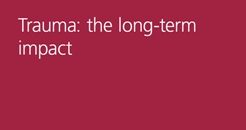 Kenny - a story of trauma
Kenny - a story of trauma
From a report by The Centre for Social Justice
The Centre for Social Justice has published, Trauma: the long-term impact. Within the report are case studies including the story of Kenny, a child of the UK care system:
When I was 11 years old, I was taken away in the back of a police car and delivered to a building with tall, imposing gates. This was a Glasgow children’s home, billed as a ‘therapeutic environment’ for vulnerable young people.
Locals resented our children’s home. They’d placed a sign protesting the building’s existence right by the gates. As far as they were concerned, the children who called this facility home were young thugs hellbent on intimidating their neighbours. We were criminals who were fire-raising and house-breaking in between committing all manner of sexual offences.
They came to this conclusion as a result of the world portrayed to them by a popular newspaper of the time. Every single bit of it was false and not based on any real understanding of what was going on in the world around me.
I was a sad young boy. I was taken away from my family not because I was a criminal or a trouble-maker or ‘difficult’, but because of a mental health crisis in the family. A mental health crisis that had resulted from years of poverty and a lack of support beyond sticking plaster efforts to get us over to the next crisis. Years of domestic violence perpetrated by my father against my mother exacerbated the crisis. If only we had received some form of support early on, perhaps the violence would have stopped, and we, the children, would not have been traumatised.
Instead, I was removed from the family home, separated from my four siblings and deposited with strangers, many of whom had been deposited there through similar circumstances. I was ferried to and from school in a taxi, and the only friends I had in my placement didn’t stay for long.
Care can become a reality for any family. All it takes is an alignment of circumstances, events you might struggle to imagine but which hit in violent succession, and then suddenly it’s your children in care, marked with a stigma that can seem indelible.
We were young, alone and frightened. Yet people were afraid of us. The campaign to shut the home down succeeded after nine years, in no small part thanks to a cross-party effort from politicians across the spectrum. It’s nice when people can set aside their differences to take on 11-year-olds!
I know that the moment I tell someone I spent time in care, every single stereotype and terrible narrative will come flooding into their mind and it’ll allow them, whether they realise it or not, to judge me. As a society, we tell ourselves to ‘be kind’ and be ‘trauma aware’; but all these years later, I don’t doubt for a second that, given the opportunity to back an ill-conceived ‘community protest’ against a children’s home, people from across
the country would fall over themselves to sign up.
We tell ourselves that we want to understand trauma but to understand is not a philosophical nicety, it’s something we have to do. It’s a verb. As a young boy, I remember a priest using the aphorism, ‘An eye for an eye makes the whole world blind’, words of wisdom sometimes attributed to Mahatma Gandhi. It wasn’t until I was older that I realised how hard it is to live those words, especially when met with deep-rooted beliefs and assumptions. When it comes to people who have been in care and end up in the criminal justice system, we need to rethink what we mean by injustice and by retribution.
Equally, when we think about our right to sit in judgement on someone’s trauma and turn it into a conversation, we need to take heed. We all have a responsibility to think about one another in the same way. There can be no time limit on our responsibility to each other or the state’s to those who need its support and understanding more than most.
Compassion is not a finite resource. It is replenished every time an 11-year-old dropped off at a children’s home is helped to make the most of their life and in turn helps make life better for the 11-year-old who comes after them. Compassion is not enough though. We need to love young people and create supportive environments where they can be loved. I don’t think institutional care works. It never has, if the outcomes are anything to go by and the number of inquiries and investigations and UN resolutions only confirm this. Care needs to be more vocational and focus less on stopping things happening to people and more on making things happen for them.
The best place for children is almost always the birth family. We should be spending our money, time and resources on keeping families together wherever possible. We could start investing in supports they need - financial but also emotional - everything from parenting classes and networks to building good relationships with social workers and the local community.
I look to my friends who grew up with relatives and know that they felt loved. Whether through the simple fact that they were told so or shown physical affection like hugs and kisses. They didn’t have to navigate formal processes where they asked to be heard and would be judged by someone putting a degree to use.
We know as a society the cost of growing up without love.
Read the full report here.
Retweet about this article:
From a report by The Centre for Social Justice, 08/09/2021